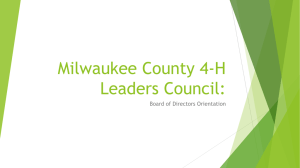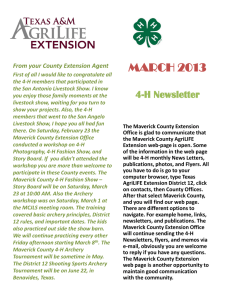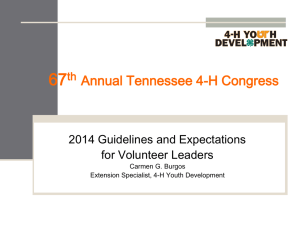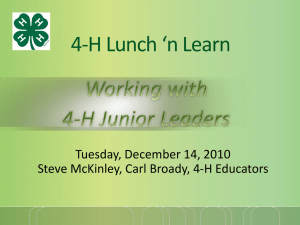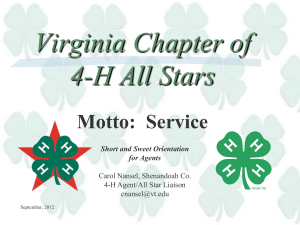4-H Policies and Procedures - Indiana 4-H
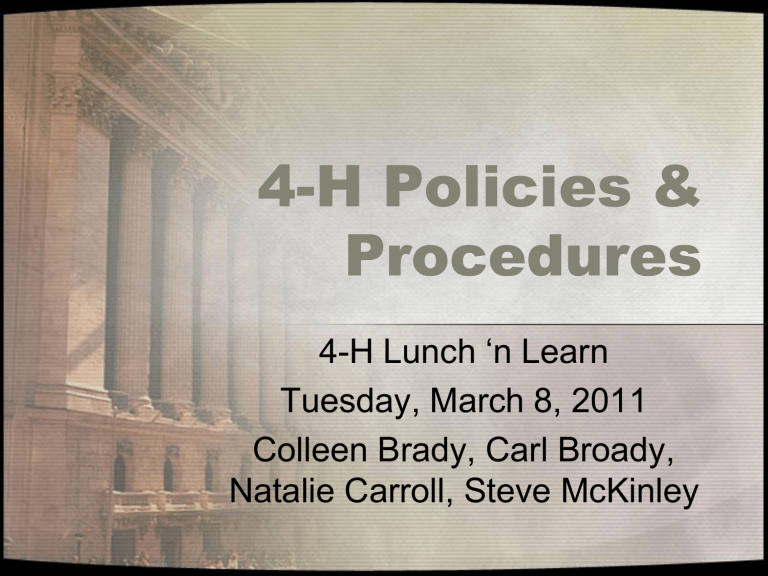
4-H Policies &
Procedures
4H Lunch ‘n Learn
Tuesday, March 8, 2011
Colleen Brady, Carl Broady,
Natalie Carroll, Steve McKinley
Where do I find answers to
4-H policy-related questions?
• Indiana 4-H Youth Program Policies and
Procedures orange notebook (rev 10/10) or at the State 4-H Web site: http://www.fourh.purdue.edu/ext_ed/policyprocedure.cfm
• Fall 2010 Youth Staff Update: http://www.fourh.purdue.edu/ext_ed/staff_update/index.cfm
Where do I find answers to
4-H policy-related questions?
• Campus County Connection (e-mailed monthly): http://www.fourh.purdue.edu/ext_ed/ccc/index.cfm
• Consultation with respective specialists – phone, e-mail, visit
Frequently Asked
Questions (FAQ’s)
1. Insurance
Directors and Officers (D&O)
Bonding
Accident Insurance
Insurance for Food Sales
What is Directors and Officers
(D&O) Liability Insurance?
• D&O coverage provides protection for wrongful acts associated with the decisions and actions of the board, its directors, and officers.
• D&O liability insurance is recommended for organizations that enter into agreements and or contracts for services that have no direct bearing on the 4-H educational mission or purpose of the organization.
• Examples of such agreements include, but are not limited to, carnivals, entertainment, food vendors, buildings, rental space/facilities, etc.
Why is D&O Needed?
• Not-for-profit organizations are 6 times more likely to have claims brought against them than for-profit boards because of the lack of structure to these boards.
• There is often no formal training for board members on how to professionally run an organization, establish and adhere to by-laws, and record and store meeting minutes.
• Directors may be held liable for the nonperformance of the organization.
Why is D&O Needed?
• Directors and officers may be held liable for claims made against the council at meetings and with the fair functions (e.g., using account as a pass-through account for the livestock auction).
• Not-for-profit organizations are frequently regulated by many statutes, rules and regulations with which directors aren’t familiar.
• Many times by-laws aren’t kept current and followed in accordance to their charter.
• Minutes may not be recorded accurately or stored effectively.
Why is D&O Needed?
• Board decisions may be seen as being made in a biased or unfair manner.
• Directors and officers may not realize secret profits or unfair gain from the use of the organization’s materials and nonpublic information.
• All directors and officers can be held personally liable for the actions of any one person acting outside of his/her organizational duty.
• Ignorance is not a defense when someone (like a new member) isn’t aware of any wrongdoing.
Example
• A 4-H Council enters into a contract with a carnival to provide rides at the County 4-H Fair. This contract is not related to the educational mission of the 4-H program, so would be beyond the coverage provided by Purdue
University to the 4-H volunteers. A fair visitor is injured while riding one of the carnival rides and sues for damages. The suit names the carnival company, the 4-H
Council (since it was the organization who entered into the agreement with the carnival), and the Council members. D&O Liability Insurance would provide coverage of the 4H Council’s decision to enter into this agreement.
Why should we bond a treasurer?
• Bonding a treasurer (and any individuals who handle the organization’s finances) insures the organization against loss of funds resulting from the misuse (or theft) of funds.
What is accident insurance?
• Each county should be purchasing $1/year insurance for each 4-H member and volunteer, likely through the American
Income Life Insurance Company.
• This provides limited supplemental medical coverage for accidents/injuries that may occur at 4-H events.
• This coverage is secondary, meaning that the individual’s/family’s insurance is primary.
When should special events accident insurance be purchased?
• Special events insurance covers accidents, injuries, and illnesses (illnesses are not covered in the $1/year policy).
• Purchase this coverage for:
– Events where non-4-H participants (youth or adults) will be present (e.g., open shows, pool parties, etc.)
– Overnight events (e.g., completion trips, camps)
• Select Plan #3 at a rate of $.23/person/ day; minimum policy is $4
Is insurance provided for the sale of food?
• Purdue University does NOT provide insurance coverage for the sale of food (e.g., bake sales, food stands, etc.)
• Coverage may be acquired through a Fair
Board policy, or by the organization itself.
Is insurance provided for the sale of food?
• Coverage should include liability issues that may arise through the sale of food items
(e.g., someone suing due to illness as a result of food eaten at a food stand).
• Accident/injury insurance for 4-H participants can be provided by the American Income Life
Insurance $1/year or special events coverage.
2. Meeting
Attendance
Required vs. Optional
Incentives
Can we require 4-H member attendance at meetings?
• NO! (A rare exception can be made for safety meetings, with explicit safety objectives included in a written lesson plan.)
• Meeting attendance can NOT be required in order for members to complete 4-H (this is a general 4-H policy statement that applies to ALL project areas).
• Required attendance would be considered exclusionary, which is in violation of guidelines for a tax-supported program.
When can member attendance be required?
• In order for a member to sell a lot in an auction
• As a condition for participation in a year-end club completion trip or for receipt of a special attendance award
• To be eligible to receive awards as a result of participation in activities such as fair setup/clean-up, fund raisers, etc.
NOTE: These types of activities are considered privileges within the 4-H program.
How can members be encouraged to attend?
• The members (and parents) need to see a purpose for attending.
• Involve the members in the meeting; help them feel ownership in the program.
• Make the meeting/activity as exciting as possible so that the members will want to choose your event over a competing event.
• Offer special incentives/awards for attendance and participation.
3. Animal Enrollment
Who can co-enroll animals?
• Siblings can co-enroll and exhibit each others’ animals prior to State Fair without endangering State Fair eligibility.
• Siblings include:
– Steps, children with shared legal guardianship in the same household
– Please note on enrollment forms relationship, if not clearly brother and sister: e.g. different last names
4. Small Animal
Vaccinations
How should vaccinations for small animals be handled?
• Human and animal health issue
– Please emphasize proper animal care and potential for zoonotic disease transfer when addressing
• We are 100% supportive of requiring vaccinations before training sessions begin
– Same risk of transfer any time animals are comingled
• All required vaccinations are required at all levels of exhibition:
– County should use State form; not their own modified form
• Someone at the county fair should be checking for compliance
– Does not need to be a vet; just confirming completion of form
5. Shooting Sports
Compliance
Policy Statement
Range Plans
Compliance Statement
• The Youth Educator must sign, if your county has a 4-H
Shooting Sports program
• Signifies compliance with all
4-H Shooting Sports policies
• Kept on file in the State 4-H
Office
Q - What policies am I agreeing to?
A – Those given in the 4-H Shooting Sports Policy
Statement.
Q – Where can I find that?
A – Procedures & Policies and at www.four-h.purdue.edu/shooting_sports
Policy Statement
• Volunteers instructors must
– Complete the Indiana 4-H Youth Development application/screening process
– Participate in the State 4-H Shooting Sports Certification
Workshop (dates & registration at: www.fourh.purdue.edu/shooting_sports)
• All Indiana 4-H Shooting Sports Programs must have a 4-H Shooting Sports Certified Coordinator.
• All 4-H shooting activities must be directly supervised by an Indiana 4-H Shooting Sports Certified Instructor, teaching in only the discipline in which he/she holds certification.
Policy Statement
• Prohibited activities:
– Arranging or conducting hunting activities with (or for)
4-H members
– Tree climbing or activities involving tree stands
– Reloading of firearms cartridges and shells
• For safety reasons, cartridges and shells should be purchased from authorized manufacturers who apply industry standards in the manufacturing and loading process.
Range Plans
• One required for each range used in the program.
• Responsibility of the County
Youth Extension Educator, usually with the assistance of the shooting sports coordinator and instructors.
• Keep a copy.
• Used when a certificate of insurance is requested.
6. Access to
Volunteer Files
Who has access to 4-H
Volunteer files?
• The 4-H Youth Development Extension
Educator is responsible for the maintenance and confidentiality of 4-H Volunteer files.
• The Educator may designate another staff member to assist with the maintenance of these files, but this person should maintain the same level of confidentiality.
Who has access to 4-H
Volunteer files?
• The 4-H Volunteer may request information from his/her file that he/she has provided
(e.g., volunteer application, signed ABE form)
• The 4-H Volunteer may not have access to information in his/her file that he/she did not provide (e.g., reference checks, notes concerning performance), without submitting a public records request. If this request is granted, then the additional information may be released to the volunteer.
7. Adult Behavioral
Expectations (ABE)
Annual Signature
Personal Liability Release Statement
Are 4-H Volunteers asked to annually sign the ABE?
• Yes. Each 4-H Volunteer should be given the opportunity to annually reaffirm their commitment to and participation in the 4-H program for the next year.
• This can be done via paper form or by using the online electronic version.
• Deadline for volunteers to complete the ABE is set by the county at a time that makes sense for the program.
What if a Volunteer doesn’t sign the ABE?
• Part of the terms under which an individual is granted the privilege of serving the 4-H program as a volunteer include following the policies that have been set. If an individual is unable/unwilling to sign the ABE, they have chosen to not serve as a volunteer in the 4-H
Program.
• We thank them for their service and wish them well in their future endeavors.
How do we address concerns regarding the personal liability statement?
• A personal conversation between the
Educator and individual is appropriate
• Talking points may include:
– Changes over time in the legal environment and the general nature of society have caused Purdue University, like many other entities throughout the state and country, to take steps which will limit their exposure to lawsuits.
– As a part of the University’s standard risk management procedures, this waiver has been added to the Adult Behavioral Expectations form that each adult is required to sign in order to serve as a volunteer with the
Indiana 4-H Youth Development Program and to the 4-H enrollment form that each parent/member is asked to sign to be a member of the
Indiana 4-H Youth Development Program.
Talking points, continued…
– When you, as a 4-H volunteer, parent, or member, sign the personal liability waiver, you are indicating that you agree to take responsibility for your own actions and decisions. If injuries happen to you due to decisions you have made or actions you have taken while a participant in the 4-H program, you agree not to sue Purdue University.
– There are inherent risks in having children involved in activities (and there is a range of risk in our programming depending on subjects/activities selected by the student/parent). Obviously, if we (or our volunteers) are negligent or remiss in our activities, we can and should be held accountable. A parent or member who signs this liability waiver does not negate Purdue’s accountability. (NOTE: new line added to end of statement in 2010.)
– The liability release statement has been recommended and approved by Purdue University’s legal counsel and Risk Management
Department.
Talking points, continued…
– Individuals who have children in group athletics in school or who are part of a day care are likely already familiar with similar liability release statement. For example, the Indiana High School Athletic Association has a liability release statement with similar language as Purdue
University’s.
– 4-H Shooting Sports, Horse & Pony, and ATV Safety project members have been asked to sign similar statements for the previous 3-4 years; it has now been expanded to include all 4-H participants (members and volunteers).
– Bottom line: it is the parent’s/volunteer’s choice to sign or not …. But we cannot allow the child’s or volunteer’s participation without a signature on the statement as it is written.
Do we need to print the electronically-signed ABE’s?
• Records of those volunteers who sign the
ABE’s electronically will be maintained indefinitely in ED.
• Printing each ABE to put in the volunteer’s file is optional.
• A print-out of all volunteers who have (and have not) signed the ABE electronically is also available via ED.
8. Vehicle Use Policy
Signature Guidance
Scenarios
What happens if a volunteer does not sign the vehicle use policy?
• Find out why…
– Did they overlook it?
– Do they not understand it?
– Are they unable to sign it?
• If they are unable to sign it, find out as many specifics as the volunteer is willing to share.
• Visit with State 4-H Office for further guidance.
• Each case will be handled on an individual basis.
Scenario #1
“I have hit 3 deer in the last year, so I’m not eligible to sign the form.”
• That’s O.K. Hitting a deer does not qualify as an at-fault crash; thus, does not affect your ability to sign the Vehicle Use Policy.
Scenario #2
“I don’t want to assume the liability of transporting youth, so I will not sign the form.”
• The Vehicle Use Policy applies to more than just transporting youth. Signing it does not mean that you will have to transport youth. The policy is in effect at any time an individual is driving on
University business (e.g., driving themselves to and from a meeting; picking up supplies for a 4-
H activity; etc.)
Scenario #3
“I have a DUI on my record, so I have an unacceptable driving record and cannot sign the form.”
• This is a time to call the State 4-H Office for further advice after you’ve talked with the volunteer.
• An individual with a DUI is not automatically disqualified as a 4-H Volunteer, but may result in termination or reassignment.
Scenario #4
“I don’t drive and have never had a driver’s license. What do I do about this policy?”
• Do not sign the form. In this case, the individual is NOT disqualified as a volunteer. A note will be put in the volunteer’s file indicating the reason the form is not signed is because the volunteer does not drive and has no driver’s license.
9. Driver Verification
Parents (Non-4-H Volunteers)
4-H Volunteers
What driver verification do parents need before transporting members?
• Parents who are asked to transport members other than their own and who are NOT screened as 4-H Volunteers (and who have not agreed to the ABE and Vehicle Use
Policy), should be asked to show a driver’s license and proof of insurance to the CES staff.
• The Educator will NOT collect this information to keep on file, but needs to have visual evidence that it does exist.
What verification do 4-H
Volunteers need to provide?
• 4-H Volunteers who have signed the ABE and the Vehicle Use Policy do not need to show any additional verification.
What additional steps should be taken when adults transport 4-H members?
• 4-H members should provide a written permission slip from their parents or guardians if they will be riding with other parents or 4-H
Volunteers to a 4-H event.
• Adult drivers should be reminded that their personal automobile insurance is primary (i.e., their insurance would provide the initial coverage for any damage or injury).
• NOTE: adults should be at least 21 years old before they transport members other than their own children.
10. 4-H Member
Signature Authority
Who should sign an 18-year old
4-H member’s paperwork?
• If an individual is 18 years of age at the time of
4-H enrollment, he or she is considered a legal adult. Thus, this individual’s signature should be on the 4-H enrollment form, health form, etc.
• The parent of this 18-year-old MAY also sign the form, but it is not a requirement.
• Even though the 18-year-old may live under the roof of the parent, this individual is still considered a legal adult.
Next 4-H Lunch ‘n Learn
Tuesday, April 12, 2011, 12-1 (ET)
